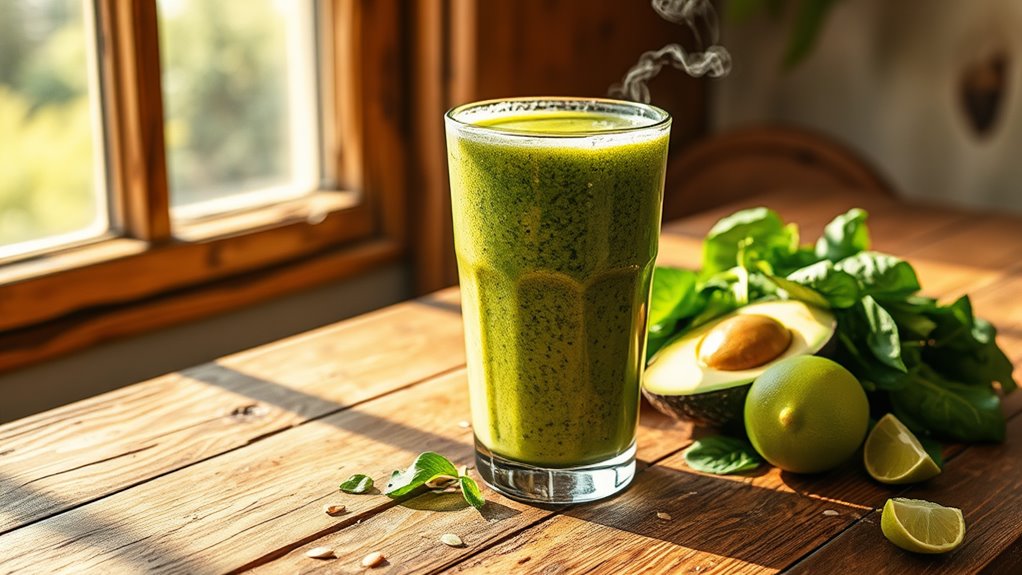Reset Your Gut in 24 Hours With This Simple Trick
Did you know that around 70% of your immune system is housed in your gut? This underscores the importance of maintaining gut health for overall well-being. If you’re feeling sluggish or experiencing digestive issues, it might be time for a reset. Fortunately, a simple 24-hour trick can make a significant impact on your gut microbiome. Let’s explore how you can restore balance and enhance your energy levels.
Key Takeaways
- Eliminate processed foods and added sugars from your diet for 24 hours to promote a gut reset.
- Incorporate whole foods rich in probiotics, such as yogurt and kimchi, to enhance gut flora balance.
- Increase hydration by drinking plenty of water and consuming hydrating fruits and vegetables for optimal digestion.
- Consume fiber-rich foods like oats, fruits, and vegetables to support healthy digestion and reduce bloating.
- Practice stress-reducing techniques, such as mindfulness or deep breathing, to positively impact gut health within 24 hours.
Understanding Gut Health
Your gut plays a crucial role in digestion, immunity, and overall well-being. A balanced gut microbiome is essential for optimal function. If you’re experiencing discomfort, bloating, or fatigue, it might be time to consider a gut reset plan. This plan typically involves eliminating processed foods, added sugars, and allergens while incorporating whole foods rich in probiotics and fiber. By following a gut reset plan, you can promote a healthier gut environment, restoring balance and function. A comprehensive guide empowers you to make informed choices for better gut health and improved vitality.
The Importance of a Healthy Gut
A healthy gut is foundational for your overall health and well-being. It plays a crucial role in digestion, nutrient absorption, and immune function.
When your gut is balanced, it helps maintain a strong immune system, reducing your risk of infections and diseases.
Additionally, a thriving gut microbiome can positively impact your mood and mental health, as it influences the production of neurotransmitters.
By prioritizing gut health, you can enhance your energy levels and promote better sleep. Incorporating proven ingredients like ginger, lemon, and apple cider vinegar into your diet can further support gut health and provide quick relief from digestive discomfort.
Simple dietary choices, like incorporating fiber-rich foods and probiotics, can significantly improve your gut health, leading to lasting benefits for your body and mind.
Signs Your Gut Needs a Reset
If you’re experiencing digestive discomfort, a noticeable decline in your energy levels, or increased food cravings, it might be time to consider a gut reset.
These signs often indicate an imbalance in your gut health that can affect your overall well-being. A simple morning routine combining lemon water, fiber-rich foods, and mindful eating practices can help you take actionable steps towards restoring balance. Recognizing these indicators early can help you take actionable steps towards restoring balance.
Digestive Discomfort Indicators
Ever wondered why you feel bloated or fatigued after meals? Your gut might be signaling it needs a reset.
Recognizing digestive discomfort indicators is key to regaining balance. Watch for these signs:
- Bloating: A swollen feeling in your abdomen, often accompanied by gas.
- Constipation: Infrequent or difficult bowel movements that can leave you feeling sluggish.
- Diarrhea: Frequent, loose stools can disrupt your day and indicate gut distress.
- Stomach Cramps: Uncomfortable pains that can signal inflammation or food intolerances.
Listening to your body helps you address these issues and restore gut health effectively.
Energy Levels Decline
Have you noticed a dip in your energy levels that just doesn’t seem to go away? This could be a sign that your gut health needs attention.
Research shows that an imbalanced gut microbiome can hinder nutrient absorption, leading to fatigue.
When beneficial bacteria decrease, harmful bacteria can thrive, causing inflammation and energy depletion.
You might find it hard to concentrate or feel sluggish throughout the day.
If you’re struggling with consistent low energy, consider resetting your gut.
Simple dietary changes, like incorporating probiotics and fiber, can restore balance and boost your vitality in just 24 hours.
Food Cravings Increase
A sudden spike in food cravings can signal that your gut health is out of balance.
When your gut microbiome is disrupted, it can lead to increased cravings for unhealthy foods.
Here are some common signs to watch for:
- Sugary Snacks: You find yourself reaching for candy or cookies.
- Salty Foods: You’re drawn to chips or pretzels more than usual.
- Processed Foods: Fast food suddenly seems irresistible.
- Increased Hunger: You feel hungry shortly after eating a meal.
Addressing these cravings through gut health can help restore balance and improve overall well-being.
Benefits of Resetting Your Gut
Why consider resetting your gut? A gut reset can enhance digestion, boost your immune system, and improve mental clarity. When your gut is in balance, you may experience increased energy levels and reduced bloating. Here’s a quick overview of the benefits:
| Benefit | Description | Evidence |
|---|---|---|
| Enhanced Digestion | Improves nutrient absorption | Journal of Nutrition |
| Immune Support | Strengthens gut barrier, fights infections | Nature Reviews |
| Increased Energy | Reduces fatigue and increases vitality | American Journal of Physiology |
| Improved Mood | Linked to serotonin production | Psychiatry Research |
Incorporating herbal teas and mindful eating practices can further support your gut reset journey. Resetting your gut can lead to a healthier, happier you!
The Role of Diet in Gut Health
Diet plays a crucial role in maintaining gut health, influencing the balance of beneficial bacteria in your microbiome.
When you nourish your gut with the right foods, you can enhance digestion and overall wellness.
Here are four dietary elements that support gut health:
- Fiber-rich foods: Think whole grains, fruits, and vegetables that feed beneficial bacteria.
- Fermented foods: Yogurt, kefir, and kimchi introduce probiotics to your system.
- Healthy fats: Avocados and olive oil help reduce inflammation in the gut.
- Hydration: Drinking enough water supports digestion and nutrient absorption.
Incorporating powerful superfoods can further boost your gut health and detoxification processes.
These components can create a thriving gut environment.
Foods to Include for Gut Reset
Resetting your gut often requires a strategic approach to the foods you consume.
Focus on incorporating fiber-rich fruits and vegetables like apples, bananas, and leafy greens to nourish beneficial gut bacteria.
Fermented foods, such as yogurt, kefir, and sauerkraut, provide probiotics that enhance gut flora.
Include whole grains like oats and quinoa for their prebiotic properties, which feed good bacteria.
Healthy fats from sources like olive oil and avocados can also support digestive health.
Staying hydrated with water is crucial, too. Additionally, incorporating science-backed superfoods can further enhance your gut health and overall well-being.
Foods to Avoid for a Healthy Gut
To foster a healthier gut, it’s essential to steer clear of certain foods that can disrupt your digestive balance.
These items can lead to inflammation and upset your microbiome.
- Processed sugars – They can feed harmful bacteria and yeast.
- Artificial sweeteners – These can negatively impact gut bacteria diversity.
- Trans fats – Found in many fried and packaged foods, they’re linked to gut inflammation.
- Gluten – For some, it can trigger digestive issues and discomfort.
Incorporating a natural anti-bloating drink can help aid digestion and alleviate discomfort caused by these foods.
Hydration and Its Impact on Gut Health
Staying properly hydrated is crucial for maintaining a healthy gut, as water plays a key role in digestion and nutrient absorption.
When you’re well-hydrated, your digestive system operates more efficiently, reducing the risk of discomfort and digestive issues.
Additionally, balancing electrolytes through hydration supports gut health, helping to maintain the right environment for beneficial bacteria to thrive.
Importance of Water Intake
How often do you consider the role of hydration in your gut health?
Water is crucial for maintaining a balanced gut environment.
When you stay hydrated, you support your gut’s microbiome and enhance nutrient absorption.
Here are four reasons to prioritize water intake:
- Promotes optimal digestion: Water helps break down food, making nutrients easier to absorb.
- Prevents constipation: Staying hydrated keeps things moving smoothly in your digestive tract.
- Flushes toxins: Proper hydration aids in the elimination of waste and toxins.
- Boosts gut lining: Adequate water intake supports the integrity of your gut lining, promoting overall health.
Hydration and Digestion Efficiency
Hydration significantly influences the efficiency of your digestion.
When you’re well-hydrated, your body produces enough saliva and digestive juices, which are crucial for breaking down food. Water helps dissolve nutrients, making them easier to absorb in your intestines.
Insufficient hydration can lead to constipation and bloating, as your body struggles to move food through your digestive tract.
Aim for at least eight glasses of water a day, adjusting for your activity level and climate.
Incorporating hydrating foods, like fruits and vegetables, can further support your gut health and improve overall digestion.
Prioritize hydration for optimal digestive function.
Electrolytes and Gut Balance
Electrolytes play a crucial role in maintaining gut balance and overall digestive health.
They help regulate hydration, muscle function, and nerve signals, directly impacting how your gut operates.
To support your gut, focus on these key electrolytes:
- Sodium: Maintains fluid balance and supports nutrient absorption.
- Potassium: Aids in muscle contractions and helps prevent bloating.
- Magnesium: Relaxes the gut muscles and promotes regular bowel movements.
- Calcium: Essential for enzyme function and digestive processes.
The Power of Probiotics
Have you ever wondered why probiotics are so often touted as a key to gut health?
These beneficial bacteria help maintain a balanced gut microbiome, which can improve digestion and enhance nutrient absorption.
Research shows that probiotics may reduce symptoms of bloating, gas, and even diarrhea.
By incorporating probiotics into your diet, whether through supplements or dairy products, you can support your gut’s natural defenses.
They can also promote a healthy immune response and may even influence your mood.
When you prioritize probiotics, you’re taking a significant step towards resetting your gut health in just 24 hours.
Fermented Foods for Gut Health
In addition to probiotics, incorporating fermented foods into your diet can significantly boost your gut health.
These foods introduce beneficial bacteria, enhancing digestion and nutrient absorption.
Here are four great options to consider:
- Sauerkraut – Packed with vitamins and enzymes, it’s great for digestion.
- Kefir – This tangy drink is rich in probiotics and supports gut flora.
- Kimchi – A spicy blend of fermented veggies, it’s delicious and gut-friendly.
- Miso – This fermented soybean paste adds umami flavor and promotes healthy gut bacteria.
Adding these to your meals can help reset your gut in just 24 hours!
The Impact of Stress on Your Gut
Stress can significantly disrupt your gut balance, leading to issues like bloating or irregular bowel movements.
When you’re stressed, your body releases hormones that can further aggravate gut health, creating a vicious cycle.
Understanding the mind-gut connection is essential for managing these effects and fostering a healthier digestive system.
Stress-Induced Gut Imbalance
How does stress affect your gut health?
Stress can disrupt the delicate balance of your gut microbiome, leading to various issues.
When you’re stressed, your body reacts in ways that can harm digestion and gut function.
Here are four effects stress can have on your gut:
- Increased inflammation: Stress triggers inflammatory responses, which can upset gut flora.
- Altered gut motility: You may experience either constipation or diarrhea.
- Weakened gut barrier: Stress can lead to leaky gut syndrome, allowing toxins to enter your bloodstream.
- Diminished nutrient absorption: Stress hinders your body’s ability to absorb essential nutrients.
Hormonal Responses Explained
Why does your gut react so dramatically during moments of stress?
When you’re stressed, your body releases hormones like cortisol and adrenaline.
These hormones prepare you for a fight-or-flight response, diverting blood away from your digestive system and slowing down gut function.
This hormonal shift can lead to issues like bloating, diarrhea, or constipation.
Additionally, stress disrupts the balance of gut bacteria, further impacting digestion and overall gut health.
Mind-Gut Connection Insights
The intricate relationship between your mind and gut plays a significant role in how your body responds to stress.
When you’re stressed, your gut can react negatively, leading to discomfort.
Here’s how stress can impact your gut:
- Increased gut permeability – Stress can weaken your gut lining, allowing toxins to enter your bloodstream.
- Altered gut microbiome – Stress can disrupt the balance of beneficial bacteria, leading to digestive issues.
- Decreased digestion efficiency – Stress slows down digestion, causing bloating and discomfort.
- Heightened inflammation – Stress triggers inflammatory responses that can exacerbate gut problems.
Addressing stress is crucial for gut health.
Mindfulness and Gut Health
What if practicing mindfulness could significantly improve your gut health?
Studies show that mindfulness techniques, like meditation and deep breathing, help reduce stress, which can negatively impact your digestive system.
When you’re stressed, your gut can react with discomfort, bloating, or irregularity.
By incorporating mindfulness into your daily routine, you can enhance your awareness of bodily sensations and emotional triggers, leading to healthier eating habits and improved digestion.
Start with just a few minutes of focused breathing each day, and gradually increase your practice.
This simple shift can create a more harmonious relationship between your mind and gut, promoting overall well-being.
The Importance of Sleep
How does a good night’s sleep influence your gut health?
Quality sleep is essential for maintaining a balanced gut microbiome.
When you rest well, you enhance digestion and nutrient absorption.
Here’s how sleep impacts your gut:
- Hormonal Balance: Sleep regulates hormones that control appetite and digestion.
- Inflammation Reduction: Deep sleep helps lower gut inflammation, promoting healing.
- Microbiome Diversity: Good sleep supports a diverse range of beneficial gut bacteria.
- Stress Management: Quality sleep reduces stress hormones, which can negatively affect gut health.
Prioritize your sleep to reset your gut and enhance overall well-being.
Exercise and Gut Function
Quality sleep sets the stage for optimal gut function, but regular exercise plays a vital role too. Engaging in physical activity boosts gut motility, enhances microbiome diversity, and reduces inflammation. Here’s a quick overview of how different exercises affect your gut:
| Exercise Type | Benefits | Recommended Duration |
|---|---|---|
| Aerobic | Increases blood flow | 30 minutes, 5x/week |
| Strength Training | Builds muscle, improves metabolism | 20-30 minutes, 3x/week |
| Yoga | Reduces stress, enhances digestion | 15-30 minutes, 3x/week |
Incorporating these exercises into your routine can significantly improve your gut health.
Simple Breathing Techniques
Breathing techniques can significantly enhance your gut health by reducing stress and promoting relaxation.
By practicing deep and diaphragmatic breathing, you not only support digestive function but also increase oxygen flow throughout your body.
Incorporating breath awareness into your daily routine can lead to a calmer mind and a healthier gut.
Benefits of Deep Breathing
Have you ever noticed how a few deep breaths can instantly shift your mood?
Deep breathing offers several benefits that can enhance your well-being.
Here are four key advantages:
- Reduces Stress: It activates your body’s relaxation response, lowering cortisol levels.
- Improves Focus: Increased oxygen flow boosts brain function, helping you concentrate better.
- Enhances Digestion: It stimulates the vagus nerve, promoting digestive processes.
- Promotes Emotional Balance: Regular practice can lead to improved mood and emotional resilience.
Incorporating deep breathing into your daily routine can truly transform your overall health and vitality.
Diaphragmatic Breathing Technique
The diaphragmatic breathing technique, often referred to as abdominal or belly breathing, is a simple yet powerful method for enhancing your overall well-being.
By engaging your diaphragm, you can improve oxygen flow, reduce stress, and promote relaxation.
To practice, sit or lie comfortably. Place one hand on your chest and the other on your abdomen. Inhale deeply through your nose, allowing your belly to rise while keeping your chest still. Exhale slowly through your mouth, feeling your belly fall. Aim for five to ten minutes daily.
This technique not only calms your mind but also supports gut health and digestion.
Breath Awareness Practices
Cultivating breath awareness can significantly enhance your physical and mental well-being.
By incorporating simple breathing techniques into your daily routine, you can promote relaxation and clarity.
Here are four effective practices:
- Box Breathing: Inhale for 4 seconds, hold for 4, exhale for 4, and pause for 4.
- 4-7-8 Breathing: Inhale for 4 seconds, hold for 7, and exhale for 8.
- Alternate Nostril Breathing: Close one nostril, inhale through the other, then switch.
- Mindful Breathing: Focus on your breath, observing its natural rhythm without alteration.
These practices can help reset your gut and improve overall health.
Herbal Teas for Digestive Health
What if a simple cup of herbal tea could soothe your digestive woes?
Herbal teas like peppermint, ginger, and chamomile have been shown to ease bloating, gas, and cramping.
Peppermint relaxes your digestive system, while ginger helps reduce nausea and promotes healthy digestion.
Chamomile, known for its calming properties, can also help alleviate digestive discomfort.
To reap the benefits, sip on these teas after meals or when you feel discomfort.
Just remember, consistency is key—make herbal tea a regular part of your routine for optimal digestive health.
Your gut will thank you for this soothing ritual.
Meal Timing and Gut Reset
Meal timing can significantly impact your gut health and overall well-being.
Research shows that an optimal eating schedule, like intermittent fasting, can improve digestion and reduce inflammation.
Additionally, understanding how meal frequency affects your gut can help you make more informed choices for a successful gut reset.
Optimal Eating Schedule
Establishing an optimal eating schedule is crucial for resetting your gut health.
Timing your meals can enhance digestion and balance gut bacteria.
Consider these four strategies to optimize your eating schedule:
-
Regular Meal Times: Aim to eat at the same times each day to regulate your body’s internal clock.
-
Balanced Portions: Include all food groups to provide essential nutrients and promote gut diversity.
-
Mindful Eating: Focus on your meal, chew thoroughly, and avoid distractions to improve digestion.
-
Hydration: Drink water between meals to support digestion and gut function without diluting stomach acids during meals.
Intermittent Fasting Benefits
Intermittent fasting (IF) has gained popularity as a powerful tool for resetting gut health and improving overall well-being.
By restricting your eating window, you allow your digestive system time to rest and recover, which can enhance gut microbiome diversity.
Research shows that IF may reduce inflammation, support healthy gut bacteria, and improve metabolic function.
You’ll likely experience better digestion and increased energy levels.
Plus, the structured meal timing can help you develop a healthier relationship with food, reducing cravings and mindless eating.
Implementing IF could be the simple yet effective strategy you need for a gut reset in just 24 hours.
Meal Frequency Impact
How does meal frequency affect your gut health?
Eating at consistent intervals can significantly influence your gut’s functionality.
Here’s how:
- Digestive Efficiency: Regular meals can enhance enzyme production, aiding digestion.
- Microbiome Balance: Frequent, balanced meals promote a diverse gut microbiome.
- Nutrient Absorption: Spacing meals allows your body to better absorb nutrients.
- Blood Sugar Control: Consistent eating patterns help stabilize blood sugar levels, reducing cravings.
Keeping a Food Journal
Keeping a food journal can significantly enhance your awareness of dietary habits and their impact on your gut health. By tracking what you eat, you can identify patterns and pinpoint foods that may cause discomfort. This simple practice can help you make informed choices, leading to better gut health.
| Date | Food Consumed | Gut Reaction |
|---|---|---|
| Day 1 | Oatmeal, Berries | No issues |
| Day 2 | Dairy, Processed Meat | Bloating |
| Day 3 | Salads, Grains | Energized |
| Day 4 | Sugary Snacks | Fatigue |
| Day 5 | Vegetables, Nuts | No issues |
Start journaling today for a healthier gut!
Listening to Your Body
Listening to your body is essential for understanding your hunger signals and recognizing digestive discomfort.
When you tune in to these signals, you can make more informed choices about what and when to eat.
This awareness not only helps you enjoy your meals but also supports better gut health overall.
Recognizing Hunger Signals
Are you in tune with your body’s hunger signals?
Recognizing these cues is essential for maintaining a healthy gut.
Listen closely to what your body tells you.
Here are four common hunger signals to pay attention to:
- Stomach Growling: A clear sign your body needs fuel.
- Fatigue: Low energy can indicate it’s time to eat.
- Irritability: Feeling cranky may suggest you’re overdue for a meal.
- Concentration Issues: Difficulty focusing often means your brain needs nourishment.
Understanding Digestive Discomfort
While recognizing hunger signals is vital for your overall health, equally important is understanding the signs of digestive discomfort.
Pay attention to symptoms like bloating, gas, or abdominal pain, as they signal that something’s off in your gut.
These sensations can indicate food intolerance, stress, or poor eating habits.
Listening to your body helps you identify triggers, enabling you to make informed dietary choices.
Keeping a food diary can be a practical way to track what causes discomfort.
Supplements to Consider
When it comes to resetting your gut, the right supplements can make a significant difference in your journey toward improved digestive health.
Here are four options you might consider:
- Probiotics – These beneficial bacteria help restore balance in your gut flora, enhancing digestion.
- Digestive Enzymes – They aid in breaking down food, which can alleviate bloating and discomfort.
- L-Glutamine – This amino acid supports gut lining repair and promotes overall gut health.
- Apple Cider Vinegar – Aids in digestion and can help regulate stomach acidity.
Incorporating these supplements can support your gut’s reset process effectively.
The Role of Fiber in Digestion
How can fiber transform your digestive health? Fiber plays a crucial role in digestion by promoting regular bowel movements and preventing constipation. It also helps maintain a healthy gut microbiome, which is essential for overall health. Here’s a quick look at fiber types and their benefits:
| Fiber Type | Benefits |
|---|---|
| Soluble Fiber | Lowers cholesterol |
| Insoluble Fiber | Aids in digestion |
| Fermentable Fiber | Fuels gut bacteria |
| Resistant Starch | Supports gut health |
Incorporating fiber-rich foods can significantly enhance your digestive function and well-being. Embrace these benefits for a healthier gut!
Avoiding Processed Foods
What if you could significantly improve your digestive health simply by adjusting your diet?
One effective way is to avoid processed foods, which often contain additives and preservatives that can disrupt your gut balance.
Instead, focus on whole, natural options.
Consider these foods:
- Fresh fruits – like apples and berries, packed with fiber and vitamins.
- Vegetables – such as leafy greens and carrots, rich in nutrients.
- Whole grains – like quinoa and brown rice, providing essential fibers.
- Lean proteins – including chicken and beans, crucial for gut repair.
Making these simple shifts can lead to a healthier gut in no time.
Creating a Gut-Healthy Meal Plan
Building on the benefits of avoiding processed foods, creating a gut-healthy meal plan can further enhance your digestive wellness.
Start by incorporating a variety of fiber-rich fruits and vegetables, like berries and leafy greens, to promote beneficial gut bacteria. Include whole grains such as quinoa and brown rice for sustained energy. Don’t forget fermented foods like yogurt and kimchi, which introduce probiotics.
Lean proteins, including fish and legumes, support overall health. Lastly, hydrate with plenty of water to aid digestion.
Staying Consistent for Long-Term Health
Consistency is key when it comes to maintaining long-term gut health.
To ensure your gut stays happy, follow these simple practices:
- Daily Fiber: Incorporate fruits, vegetables, and whole grains to keep your gut microbiome thriving.
- Hydration: Drink plenty of water to support digestion and nutrient absorption.
- Probiotics: Include fermented foods like yogurt or kimchi to boost beneficial bacteria.
- Regular Meals: Stick to a consistent eating schedule to help regulate your digestive system.





